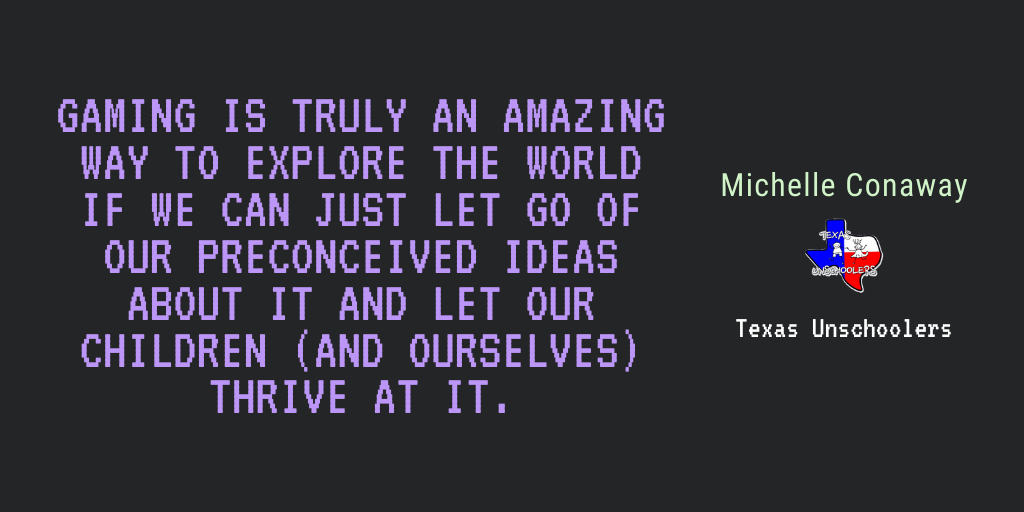
Forward to this article: I wrote this article on my personal blog back in 2012. It has by far been the most popular blog post on my personal site. I thought it might be beneficial to some to share it here. I’ve learned since I wrote this article that everything in this post can be applied to just about every video game, tv show, movie, pop culture and everything in between. It just requires for the parent or guardian to step out of what they’ve been told about visual media and watch what is actually going on with the individual child.~ Michelle Conaway
Who would have ever thought I would have been okay with my kids making a full time job out of playing a video game? I sure never thought I would get there. But I have. My boys spend most of their waking hours on a computer game called Minecraft.
Over the years, after I decided to homeschool, I found myself migrating more towards a philosophy of life called Unschooling. Yes, we pulled out the text books and “educational” websites at the beginning of our homeschooling journey, but my kids got bored with it. I saw them resisting the work I was providing for them and not retaining much of what I was teaching. They would even pretend to be sleeping in the mornings, trying to avoid my “school” work.
For the last couple of years, I’ve let go of doing anything that looked schoolish. Of course, if they want to do worksheets, they are welcome to explore that, but gone are the days that I force them to sit and do anything. Instead, I’ve started asking them what they would like to do and let them do it. What I’ve observed as they play video games, watch cartoons, make their own cartoons on Zimmertwins and read Garfield books is a huge improvement in their reading, math, vocabulary and social skills. In essence, I’ve fully embraced the unschooling philosophy that everyone learns differently and learns best when given the opportunity to pursue things that they enjoy doing. I know I always have. Why would that be different for my kids?
In March we were introduced to the computer game called Minecraft. My boys took to it like nobody’s business! This game is so much fun and the fun and depth with which they play never ends. You can create worlds from scratch, build your own towns, tools, weapons and avatars. You can play on multi servers where you plan communities with other people playing the game. I have observed my kids developing many new skills playing Minecraft and wanted to write about them here.
Problem Solving Skills
When you spawn in Minecraft you are in the middle of nowhere with only trees, caves and animals roaming around. If you are playing in survival mode, you will also see creepers, skeletons, zombies, spiders or enderman that will attack you starting at sundown. You must try to survive by cutting down trees and building yourself some type of primitive shelter to protect yourself from the monsters that come out at night. You also have a hunger bar and if you don’t find food, you will die.
Sounds easy, but trust me it’s not. You must come up with a statagy for surviving that first night and be quick about it lest you die at the hands of the monsters in the dark or a hungry belly. I have seen the kids come up with elaborate plans for surviving that first night. They’ve learned to hunt for food, build shelter, mine coal for torches and make tools from natural resources all within the span of a 10 minute Minecraft “day”.
After that, they have to think quickly about how to continue to survive and build up a world in which they can live more easily. They plan gardens, set up farms with pigs, cows and chickens, build crafting tables and furnaces. They figure out how deep they must mine in a cave to find diamonds, gold and other precious metals. They must learn which weapons or tools work best for hunting, defending themselves against monsters and mining. The stakes get higher the more you survive. If you die you are at risk of losing all of the accumulated materials you have collected in your inventory.
Minecraft provides a continuous arena in which to flex those problem solving muscles and continue down the path to further development in the game.
Research Skills
The boys have learned how to research by playing Minecraft. When they want to learn a new trick or how to build an intricate lighting system for a mansion they have built they head to WikiHow, Youtube and other internet sources. There they find tutorials on how to build elaborate systems for their cities- how to run recessed lighting, how to build irrigation systems, how to plant and maintain gardens and how to build extravagant things like showers for the bathrooms or fireplaces for the living rooms. They have learned to bookmark their favorite tutorial sites, share them with friends, and even explain to others how to do certain things. They are even considering doing their own tutorial videos for youtube.
Communication Skills
The boys have learned to communicate very well playing Minecraft. They have met friends through our Shine with Unschooling group and also through the Unschooling Gamers Yahoo Group and Facebook Group. Through these groups they have learned to set up and use Skype. It’s not uncommon to have several kids from all over the world playing Minecraft on our family server while skyping with each other.
They are learning to work together to gather food for the community, build stores to sell armor, weapons and food, build amusement parks and engineer new cities. They are learning to maneuver through different personality types and problem solve disputes between the players. They are learning to respect the wishes of others and communicate their own wishes and come to agreements on what is going to happen within the world.
If they don’t learn to communicate well on Minecraft, the game doesn’t go as well. Working with others on the Multiplayer servers is key to building and maintaining a world that works for everyone. Kind of like real life, huh?
Typing Skills
With no keyboard or formal typing lessons, the boys have become very fast keyboarders. There is a chat section on Minecraft which has motivated them to learn to type faster and more accurately.
Cameron told me the other day that he is so glad I didn’t force him to do the typing program I tried to get him to do. Through his love of working on the computer he has gotten to be a master typist.
Spelling Skills
Spelling has improved immensely for the boys as they learn to navigate through the internet and chat with friends on Minecraft. It is essential that they are able to communicate with their friends on the chat section of Minecraft or in forums where they are trying to get answers to their questions. This has motivated them to learn to spell well so that they are understood by their friends.
Vocabulary
I have seen the boys vocabulary expand a lot as they learn new words through friends or on the internet in articles they are reading about Minecraft. Many times they use words that me and their Dad are amazed by. Their new vocabulary spills out into their every day conversations. I can’t imagine that my forced vocabulary lists would have yielded boys who use language as well as they do.
Science
Both Cameron and Caleb have asked to go to the library to get books about diamonds, obsidian, gold, silver and other gemstones. They have learned a lot about the layers of the earth. They have learned about all types of stone, wood, gemstones, caves and mining. Their love of Minecraft has peeked their interest in all sorts of geological study.
They have also become interested in Bioms. There are deserts, jungles, forests and oceans on Minecraft. Many different creatures live within the different biomes and the kids have loved learning about them all and often jump over to the internet to explore one biome or another.
Creativity
I have seen a surge of creativity in the boys since they started playing Minecraft. Cameron’s love of drawing has expanded to drawing worlds of Minecraft scenery. Caleb has come up with stories about Minecraft characters. They have learned to invent tools and other things that help them problem solve in their game. Caleb and I even built a real stone pickax out of sticks and stones at the family farm recently.
I see them being more creative about problem solving in real life as well. They are more likely now to work out a problem for themselves, rather than ask me for a solution. They seem to be getting more creative in everything they do.
Math and Spacial Reasoning Skills
In order to build a structure that is functional as well as visually pleasing, you must develop math and spacial reasoning skills. I have seen the boys figure out in their heads how many blocks will be necessary for a foundation – doubling, tripling and even quadrupling that number in their heads and then apply that to a building in Minecraft. I have witnessed them taking an idea in their minds and building complete cities with recessed lighting and fountains and statues and stores using spacial reasoning and math skills. They are figuring it out on their own without any “formal” training in engineering. It really is remarkable to see some of the things they’re building. I also have Minecraft installed on my computer and haven’t had near the success that these kids do. Obviously, spacial reasoning and I don’t get along very well.
If you’re worried that your child is playing too many video games or that they seem to spend a lifetime on Minecraft, just know and trust that they ARE learning. Play the game yourself to get an idea of the difficulties that must be endured just to survive much less build elaborate cities. Talk to your kids and listen to what they are doing and how they are figuring out HOW to do it.
They ARE learning from these games. Many times it’s obvious that they are gaining valuable skills and sometimes it looks just like play. Gaming is truly an amazing way to explore the world if we can just let go of our preconceived ideas about it and let our children (and ourselves) thrive at it.
-Michelle
Learn more about Michelle on our Contributors page.

